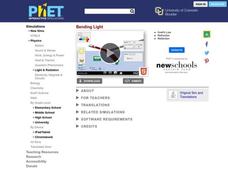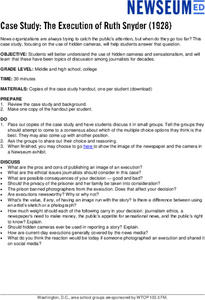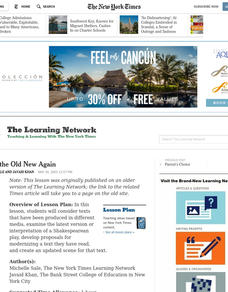Federal Reserve Bank
Expense Tracking
Where does all your money go? Individuals keep a record of the money they spend over the course of 30 days. They then categorize where they are spending their money and write an essay detailing their findings.
Practical Money Skills
Budgeting Your Money
How do you make sure that your income doesn't disappear before you have a chance to save it? Use a creative budgeting activity to teach learners in both special education and mainstream classes how to keep track of their expenditures and...
Federal Reserve Bank
Lesson 3: A Fresh Start
The members of your economics class may be busy earning graduation credits, but the credit they should be concerned about is their financial credit. The third instructional activity in a unit about Hurricane Katrina and other events that...
Curated OER
Using HyperStudio
Second through eighth graders use the software "HyperStudio" to create a presentation of their choice on Native American lifestyles. One thing I like a lot about this lesson, is that the students are the ones who get to choose and...
Curated OER
History in Literature - The House of Dies Drear
Hook your learners with a great project. They research the underground railroad and civil rights movement through literature, view the video The Underground Railroad: Escape from Slavery, and read the book House of Dies Drear in their...
Council for Economic Education
Balance of Payments (BOP)
Have you ever checked your clothes to see how many nations created them? Pupils take a deeper look at international trade and the balance of payments nations have with one another. They use calculations, simulations, and primary sources...
Media Smarts
Television Broadcast Ratings
Explore the relationships between programming, advertising, and the ensuing rating wars. Help develop the media smarts of your pupils through this examination of advertisers for popular shows. Although the included Sweep Chart features...
Utah Education Network (UEN)
Evaluating the Format of Informational Text
Make your learners aware of the advantages and disadvantages of using different media in presentations. This straightforward resource evaluates media formations such as print, digital text, and videos. Although the subject of ballet is...
Northwest Career & Technical Academy Foundation
What's Mine Isn't (Necessarily) Yours
When we use images or ideas from the Internet, we might be infringing on someone's rights. Give your class the opportunity to understand copyright and creator's rights as they evaluate fair and legal use of media found online. As they...
Road to Grammar
Techonology
Technology is a hot topic, so why not discuss it with your English language learners? There are three viewpoints from students included on this page, along with vocabulary words and ten tech-related questions to discuss.
PHET
Bending Light
Different colors of the spectrum travel at different speeds through media, causing them to refract at different angles—which allows humans to see their colors. Through a simulation, pupils see how air, water, and other media bend light....
CK-12 Foundation
Data Summary and Presentation: Chart for Grouping Data
Get social! Create a display of social media use for a class. Pupils use provided information about the time spent on social media to construct a histogram. Using the histogram, learners interpret the data to answer questions.
Facebook
Building Your Activist Network
Can social media bring activists together? Learners gain experience in using online media tools to raise awareness during a hands-on activity from a digital citizenship library. Once they identify a cause, groups create a unified message...
Eau Claire Area School District
Intellectual Property Lesson Plans
Fair use, intellectual property, public domain ... what does it all mean? Scholars act as judges to determine if different scenarios constitute fair use. They also advance their research skills by practicing paraphrasing and citing...
Newseum
Case Study: The Execution of Ruth Snyder (1928)
The case of the 1928 execution of Ruth Snyder takes center stage in a lesson that asks young journalists to consider the ethics involved in publishing an image of an execution. A series of discussion questions ask individuals how they...
Newseum
Is It Fair?
Young journalists learn how to analyze word choice, context, and counterpoints to judge the fairness of a news story. They practice using these tools to judge a series of headlines for the story of Goldilocks and the Three Bears. They...
Japan Society
The Russo-Japanese War, 1904-1905: A Turning Point in Japanese History, World History, and How War is Conveyed to the Public
The big question: How did Russo-Japanese War imagery and the press influence Japanese perception of the war? Learners consider this big question as they compare and contrast various artistic media from the period. The lesson is...
EngageNY
Analyzing the Power of Different Mediums: A Mighty Long Way
Weigh the pros and cons. Class members continue sharing their thoughts on media and events by watching the video John Chancellor Reports on the Integration at Central High School. They discuss the advantages and disadvantages of gaining...
Curated OER
Making the Old New Again
How does a new version of a Shakespearean play change in the adaptation process? Use this New York Times' Learning Network instructional activity to consider texts that have been produced in different media. Middle schoolers examine the...
Curated OER
Thinking Ahead to Next Year
End your school year in reflection. Ask your class to leave advice for those who follow in their footsteps, or write informative letters to the teachers who teach them next year. This is a great way to gather memories, improvements,...
Curated OER
An Introduction to Law
With so many different types of law, it can be difficult for learners to discern which is which! Use a newspaper to give tangible examples of various types of law, including criminal, civil, consumer, family, local, state, federal and...
Curated OER
Fact vs. Opinion (Part II)
How can you tell the difference between fact and opinion? Using newspapers, learners determine which articles contain statements of fact, and which articles reflect the writer's opinion. The lesson plan includes a discussion format and a...
Curated OER
Articulated/Moveable Paper Dolls
Students create articulated/moveable dolls, that fit a specific theme, using various forms of media, including recycled paper, jewelry, foil, and other items. They may choose to display their dolls on a background.
Curated OER
Math: Navigating the World Around Me
Young mathematicians research and discuss real world math word problems and ways in which they apply math concepts in their everyday lives. They create a storyboard of a math word problem from which they create a slide for a multi-media...

























